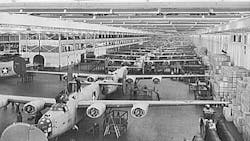From Artillery to Autonomy: Historic Ford Site Will Test Self-Driving Vehicles
Willow Run, a former site of Ford Motor Company’s munitions operations during World War II, will be redeveloped as a connected and automated vehicle testing facility, Michigan’s state economic development agency announced earlier this week.
The state has purchased 311 acres of the property in Ypsilanti Township, Mich., from a trust for $1.2 million. It will be developed and operated by the American Center for Mobility (ACM), a collaboration between the state of Michigan, the University of Michigan, and area economic development agencies.
Steve Afwood, CEO of Michigan Economic Development Corp., said in a press release that the goal is to make the facility a global leader in connected technology “and a major economic driving engine for the entire state.”
“The whole project represents a multi- layered partnership between many groups, and getting the agreement in place toward the purchase of the land is a giant step forward,” he said.
John Maddox, formerly associate director of the University of Michigan’s Mobility Transformation Center, was named CEO of the Willow Run project in April. He is working with the state and the trust on plans for the project, facility designs and regulatory agreements for the testing environment.
.Detroit’s status as the Arsenal of Democracy had its roots at Willow Run, where Henry Ford applied principles of mass production in support of the allied effort in World War II, employing more than 40,000 people and producing an average of one B-24 Liberator bomber every 55 minutes. Willow Run also was the iconic birthplace of “Rosie the Riveter,” symbolic of the widespread contribution of women to the industrial war effort. Later, General Motors workers produced more than 5 million transmissions at the Willow Run Powertrain Plant.
RACER Trust took title to the property in 2011. It sold the historic bomber plant portion of the property to Yankee Air Museum, which is converting it to the National Museum of Aviation and Technology at Historic Willow Run. The majority of the remaining buildings on the site were demolished.
About the Author
IW Staff
Find contact information for the IndustryWeek staff: Contact IndustryWeek
